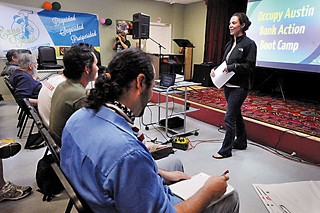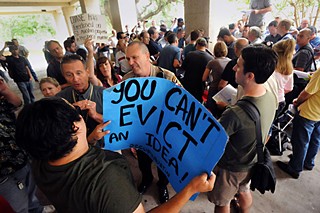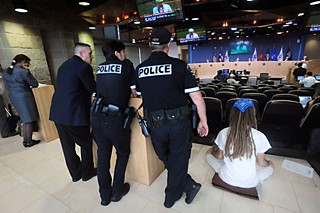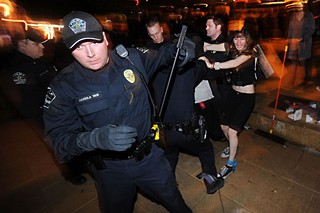What's Your Occupation?
Occupy Austin occupies Independence Day – and considers its future
By Adam Wasch, Fri., June 29, 2012

"ONE, we are the people!
TWO, we are united!
THREE, the Occupation just got started!"
– Occupy Austin chant on the plaza of City Hall on Feb. 3, as Austin police moved to evict the remaining Occupiers

Occupy Austin is planning a Fourth of July rally on the state Capitol grounds to compose a list of grievances and hold a series of teach-ins and marches. This is the first locally organized effort to collectively answer the question, "What do y'all want?" since the 99 percenters were evicted from Austin's City Hall steps in early February.
Hecklers and academics aside, no one is more concerned with the future of the Occupy Austin than its own participants. For the moment, fundamental questions about organizational process and personal identity preoccupy many of its most active participants, who eschew structure and are deeply suspicious of the very nature of politics. What is complicated enough; how seems nearly unattainable.
What It Is
"It's not even obvious what Occupy is," says Austin Occupy activist John Duffy, 30. "There's internal debate regularly about, overall, what it is. The people who happened to show up to take action in that physical space developed relationships – some positive, some negative – and now with the physical space removed, I think that's left people who've formed solid bonds and fell into affinity groups." Duffy is the closest Occupy Austin has come, so far, to a single public face. He ran for City Council this past May – one of six candidates challenging Place 5 incumbent Bill Spelman – and won 6% of the vote. Duffy admits that he ran on a lark and that he never expected to win; therefore he didn't work out a platform to run on. He's mostly concerned with environmental issues and says his dream is to live away from people in the woods with his girlfriend.
The Occupation on the steps of City Hall lasted about four months until demonstrators were evicted February 3. It has since splintered into at least a half-dozen causes, but welcomes public participation at all its events. It still meets regularly on City Hall's steps but goes home to sleep.
Occupy Austin today offers a range of interest groups to get involved with. There's an anarchist study group, interfaith prayer sessions, OccuQueers, an activist "welcome wagon," potlucks, a group against charter school expansion in Austin's public schools, and a group determined to help the tenants who've lost access to their homes at Wood Ridge Apartments due to chronic maintenance problems there. There's also an "End Corporate Personhood" working group that's generating renewed interest.

In one sense, Occupy increasingly has become the group you get in touch with if you want to create a spectacle, infuse some gusto into a protest, or annoy the hell out of the cops. But actually accomplish something? That's up for debate.
Working the Banks
One of Occupy Austin's goal-oriented efforts is the Bank Action Working Group, which supports divesting the city's money from large commercial banks and moving it to local credit unions. Credit unions (at least in principle) are controlled by members. The group perceives big commercial banks as being concerned with profit alone at the expense of the homeowners they continue to foreclose upon in the aftermath of the housing bust.
The bank action group successfully lobbied Council Member Laura Morrison to introduce a measure, passed unanimously in February, instructing city staff to investigate moving city accounts to local credit unions, or at least local banks. The city manager responded with an analysis stating that existing legal and fiduciary requirements would make such a move impossible. For example, the sheer size of the city's banking needs would easily exceed local banks' ability to maintain sufficient capital in reserve; subsequently council approved staff's proposal to place its accounts with JP Morgan Chase – the only bank that had responded to the city's request for proposals.
Nevertheless, municipalities in other states are exploring ways to withdraw money from the large banks that many voters associate with foreclosures and taxpayer bailouts. For example, Occupy Buffalo (New York) last month helped to persuade that city's comptroller to transfer $45 million in city funds from JP Morgan into a locally owned bank. Similar proposals are getting attention in Los Angeles, Kansas City, Seattle, and other Pacific Northwest cities such as Eugene and Portland, Ore.
The question of where the city of Austin does its banking will come up again in three years after the newly approved contract ends. By then, Occupy says it will be ready with better researched and actionable demands. The group would like to see the development of an ethical standard to determine what banks are eligible to work with the city – similar to the method by which the city increasingly applies labor and hiring standards to major companies seeking to build facilities in Austin in exchange for tax incentives. For now, the Bank Action Working Group wants to focus on educating itself and the public about the practices of the big Wall Street banks.

Dave Cortez, 28, works prominently within the bank action group. Cortez himself is a professional organizer and works for the BlueGreen Alliance, a coalition of unions and environmental groups, including the Sierra Club. Last fall, at the height of the Occupy movement, Cortez helped organize a march on Bank of America Downtown. His group approached account holders as they walked out of the bank on Congress Avenue – they claim they encouraged locals to transfer $72,000 out of the bank that day to credit unions.
More recently, Cortez could be seen targeting the financial system by beating a plastic bucket-drum outside Blue Sage Capital on June 14. Occupy Austin activists and United Steelworkers, Texas State Employees Union, and AFL-CIO members claim Blue Sage's backing is indirectly helping an Indiana firm to union-bust.
Don't Follow Leaders
Cortez struggles with the concept of being a leader and, for the most part, seeks to avoid behaving like one, even if that means the causes he supports might suffer due to inattention or organizational paralysis. For him, Occupy must remain a "horizontal" organization that operates on the principle of consensus. Introducing more structure would risk marginalizing the motivations that led many activists to get involved with Occupy in the first place, Cortez says. Establishing formal meeting rules, imposing a quorum rule, or even defining who's a member and who's not would simply mimic the oppressive tactics of the current political system. "I think that when you have too much structure, too many rules, or none at all, people will naturally figure something out that works in the middle," he says. "It may not happen – this may be a total death blow – but it's all a radical experiment anyway."
In a bid to help Occupy Austin hone its political-action skills, Cortez invited friend and full-time community organizer Betsy Dillner, 28, from Seattle to help train activists here in organizing a successful divestment campaign. Dillner works with the Alliance for a Just Society, a coalition of several grassroots organizations in the Pacific Northwest. A couple dozen Occupy activists showed up for the June 2 workshop.
"Occupy gave a point of entry for people who were having a lot of frustration about their economic situation, [and] in a way that traditional political organizations seldom can inspire," Dillner says. "The thing about starting something new is that no one really knows how it will turn out. We're all hoping that Occupy can figure out what its message is and how to translate it into local power."

Cortez acknowledges that Texas lacks a base of organizational support for Occupy to rely on, and that Occupy's more spontaneous inclinations make the prospect of pulling off a long-term campaign – such as convincing the city to divest from big banks – daunting. "The fact of the matter is, these campaigns that are run across the country have staff, several staff, and researchers [and] canvassing staff to go out and find victims and talk to them," Cortez says. "The reason we got the trainer down from Seattle is because we don't have any of those organizations in Texas. There are no organizing groups that are focusing on financial and housing justice, so as a ragtag group of volunteers and activists, we have to figure it out."
Cortez also hoped more Occupy activists, especially those with specific skills relevant to the banking arena, would have showed up for the training. Experts are in short supply in Occupy Austin. "We had a couple, but it wasn't easy to keep them around because the horizontal model that we were using required a ton of patience," Cortez says.
Tony Floriani, 28, has been an activist with Occupy Austin from its earliest stages and was one of those arrested in October when police enforced new rules against food tables at the Occupy site. "I think that the training we did is part of a bigger push, a bigger realization, that we need to give potential activists a way to get involved and a way to empower themselves with knowledge to actually accomplish the things they want to get done," he says. "That was a big issue with the early Occupy movement – there was a lot of enthusiasm, but very little actual experience challenging power. It does take some serious organization."
Muddled Messaging
The question of how much to organize – or even whether to organize at all – plagues Occupy Austin. This tension can be seen in the promotional material Occupy is distributing to publicize its "Occupy Your Capitol" event on the Fourth of July. "We are going to create the new world that we want to live in," it reads. "We will no longer listen to your lies that tell us that we have to choose our issues to fight."
Even as organizers exhort people to create a list of grievances, they insist they don't have to.

The Declaration of Independence, which the "Occupy Your Capitol" event intones as its model, was addressed to a monarch. In a democracy, voters elect people to represent their interests. Yet, organizers of the Fourth of July event suggest that Americans are subjugated to power, not in control of it as voting members of the electorate. "The Occupy movement is the last chance that this country, and this globe, has to fight against the powers that will destroy our world," promoters warn.
For Maryann Philbrook, 28, Occupy Austin is personal. It makes her feel connected to the various people and causes that Occupy proclaims. Whether it's the homeless or the Wood Ridge Apartment tenants, Occupy's physical proximity to the people it seeks to help inspires her, she says. "I volunteered at homeless shelters since I moved to Austin," Philbrook says. "I've never really gotten to know anybody that was homeless because I came in as a volunteer. When I come down to Occupy, I'm a peer now, with people that are normally in a position of no power. That totally, fundamentally changes your relationship."
Nonconformity Is Sexy
Occupy Austin's unwillingness to transform into a more conventional activist group is also a badge of honor for some, no matter what long-term consequences it may have for the loose-knit organization or its reputation. Many Occupy activists are content to use Occupy forums as a social medium to connect with others of similar interests or, simply, to thumb their nose at authority, à la Saul Alinsky.
"There are a lot of people who snicker and giggle with enjoyment of being [in] this group," former council contender Duffy says. "It's like the beautiful woman in the room who really wants everyone in the room to want to fuck her and you're the guy who just does not give a damn and you cannot be bothered to look up from your book."
He continues: "There's this idea that the political structure demands that you focus your attention on them, that if you're going to be a movement of the people, then you must go before the powers and try to change them from within so they can swallow you up and make you a part of them. I love the idea that says that we're going to try to change individual lives, one at a time."
For Cortez, this level of exuberance is sometimes troubling. "I'm hopeful that we can find more points of convergence down the line," he says. "That's where I'm pretty pessimistic – there are too many directions, and the desire to be in the fight, and solidarity with this and that is just unsustainable, and it's losing steam quickly. It's lost a lot of steam, and people don't even know what the hell is going on anymore. But it is, in a positive sense, organizing and resistance, and it's got people at least talking."
Occupy Austin looks on with admiration, maybe even envy, to popular movements in play from Egypt to Quebec. And while grievances were sufficient to spur mass protests in those places, resolution would seem to require the judicious and consensual application of political power. In contrast, Occupy Austin consistently cites corporate greed and influence in its rallying cries for justice, but at the same time doubts whether organizational power is the solution.
Occupy Austin's Fourth of July rally is being coordinated with Occupy activists in the Philadelphia area, who are touting a national weekend of convergence. In Austin, the rally is an opportunity to articulate an agenda, but also a chance to decide what to do about it.
For more information on the rally, visit www.occupyaustin.org/occupyj4. Find John Anderson's complete Occupy Austin photo gallery at austinchronicle.com/occupy-austin.
Got something to say on the subject? Send a letter to the editor.









